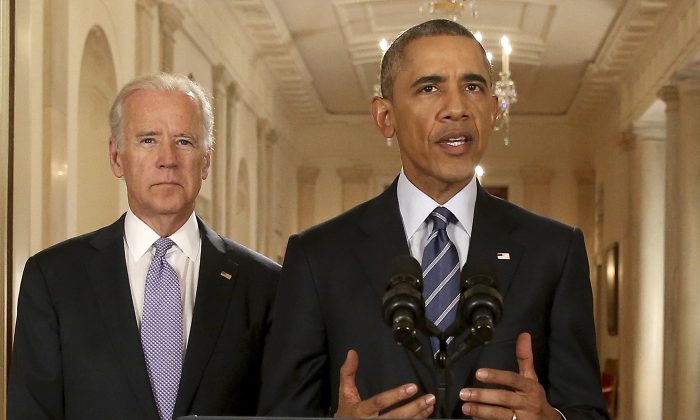https://www.theepochtimes.com/did-obama-have-a-quid-pro-quo-with-iran_3150421.ht...
Former President Barack Obama, standing with Former Vice President Joe Biden, talks about the Iran Nuclear Deal on July 14, 2015. (Andrew Harnik-Pool/Getty Images)
Christopher C. Hull
CONTRIBUTORHere’s a question Iran critics such as U.S. Senators Tom Cotton (R-Ark.) and Ted Cruz (R-Texas) may want to ask: Did Barack Obama have a secret quid pro quo with Iran in 2008 or 2012?
The question has new resonance, not just because of trumped-up charges that the Trump administration had a quid pro quo with Ukraine, but because of emerging reports Iran did indeed have uranium at a site the country had called a carpet cleaning factory.
Specifically, on Nov. 11, the BBC reported the International Atomic Energy Agency (IAEA) confirmed its inspectors “detected natural uranium particles of anthropogenic origin at a location in Iran not declared to the agency.”
The revelation seemed to confirm charges Israeli Prime Minister Benjamin Netanyahu leveled in his 2018 U.N. speech, showing photos of a complex in Turquzabad he called, “a secret atomic warehouse for storing massive amounts of equipment and materiel from Iran’s secret nuclear weapons program.”
The IAEA’s report raises questions about the process Obama went through to get the Iran Deal that Congress failed to defeat during the Obama administration—which the Trump administration has rightly rejected.
Unlike Ukraine, Iran is one of the United States’ most hated enemies. According to Gallup, the American people since at least 1990—and likely since Iran’s Islamic revolution in 1979—have held a consistently negative view of Iran, understandably so given the country’s American hostage-taking, American soldier-killing, “Death-to-America”-chanting ways.
Yet in 2008, then-candidate Obama openly signaled he hoped to engage Iran in a conversation about working together. Moreover, one critic charged Obama sent former Clinton State Department official William Miller to Iran to say “he was a friend of the Islamic Republic, and that they would be very happy with his policies.”
Another critic characterized this outreach as “a private citizen going to foreign soil obviously in order to evade U.S. intelligence monitoring and establishing a back channel with a sworn enemy of the United States who was actively disrupting our efforts in the military in the Middle East.”
Miller has recanted, but the Iranians maintained intransigence to Bush pressure, confirming Obama’s public premise.Fast forward: As 2012 approached, a Chamberlin-minded mediaite called on Obama to pause his Iran “policy of pressure, pressure and more pressure” and engage President Mahmoud Ahmadinejad, whom he dubbed a “pragmatist.”
But Syria began to descend into civil war, aided by Iranians and their proxies, as one opponent, a Sunni jihadi force we now know as Islamic State, metastasized across Syria and Iraq. Gulf powers began to beg Washington to help “moderate” Sunni opposition.
One excellent exegesis by Michael Doran in Mosaic magazine reports that then-CIA Director David Petraeus “put together a plan to train and equip Syrian rebels in Jordan and to assist them once back in Syria,” garnering support from then-Secretary of State Clinton, then-Defense Secretary Leon Panetta, and then-chairman of the Joint Chiefs Martin Dempsey.
But Obama said no.
Why?
Doran charges one potential reason was Obama’s “fear of antagonizing Iran”—leading not only to the Syrian slaughter, but the largest refugee crisis since World War II.
Instead, in July 2012, Jake Sullivan, then-State Department director of policy planning, traveled secretly to Oman to meet with Iranian officials.
What Sullivan said is not known, but we do know that at almost this exact time, a hot mic caught President Obama telling another foreign leader—of Russia no less–“this can be solved, but it’s important … to give me space. This is my last election. After my election, I have more flexibility.”
Was a similar message delivered in Oman?
That is, did Barack Obama collude with not just Russia but Iran to win the 2012 presidential election?
In early 2013, with then-President Obama safely reelected and his new-found flexibility in hand, his administration developed another secret bilateral channel to Ahmadinejad’s government—not Rouhani’s so-called moderate government starting in June 2013, as the Obama administration later claimed, but the hard-line one.

 Forum
Forum

 Home
Home 

 Album
Album 

 Help
Help

 Search
Search

 Recent
Recent 

 Rules
Rules 

 Login
Login

 Register
Register





 Pages: 1
Pages: 1 

